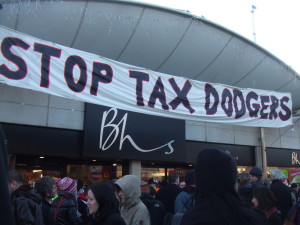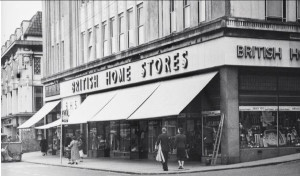Dozens of staff face losing their jobs as one of Brighton’s biggest shops, BHS in Churchill Square, is expected to close as the company goes into administration.
The collapse of BHS – founded as British Home Stores – is anticipated this week and may happen as early as this morning (Monday 25 April).
The specialist firm, Duff and Phelps, was standing by on Friday (22 April) to handle the insolvency, according to newspaper reports.
But the plans were delayed when Sports Direct opened last-minute talks to try to keep BHS trading, possibly by buying some of the department store chain’s leases.

Sports Direct, run by Newcastle United owner Mike Ashley, has taken a stake in BHS in the past, bought the lease of at least one store and has concessions in some branches.
Rescue talks, including those involving Sports Direct, were said to have faltered over BHS’s £1.3 billion debts including its £571 million pension deficit.
The pension black hole has already come under scrutiny from the Pension Regulator, which is based next to Brighton Station.
The demise of BHS has been described as the biggest failure on the high street since Woolworths went bust in 2008.
The billionaire retailer Sir Philip Green sold BHS for £1 last year to a group of investors led by the former racing driver Dominic Chappell. Mr Chappell has been bankrupt twice.
There are hopes that Sir Philip, who owns Topshop, Miss Selfridge and Dorothy Perkins, will use the BHS premises in Brighton for one of his other brands.
The key Churchill Square unit will become vacant as Boots looks for a new home, with John Lewis having bought its North Street premises.
British Home Stores has occupied its current site since Churchill Square opened at the end of the 1960s. It was previously on the north side of Western Road, between Crown Street and Marlborough Street. C&A took over the building in 1970 and it is now home to Primark.










It will be a shame to see BHS go, but they had really lost their way in terms of what market they were after with the supermarkets stocking clothes and the competition from the likes of Primark.
Although there seemed to be major investment in the Brighton store, many others seems to be stuck in the 1960s – the Worthing store was a case in point with a ‘restaurant’ looking more like a eastern European works canteen.
Not sure what the picture of the protests about Sir Phillip Green’s tax affairs has to do with the closure – unless of course many anti-austerity activists avoided the store because of him.